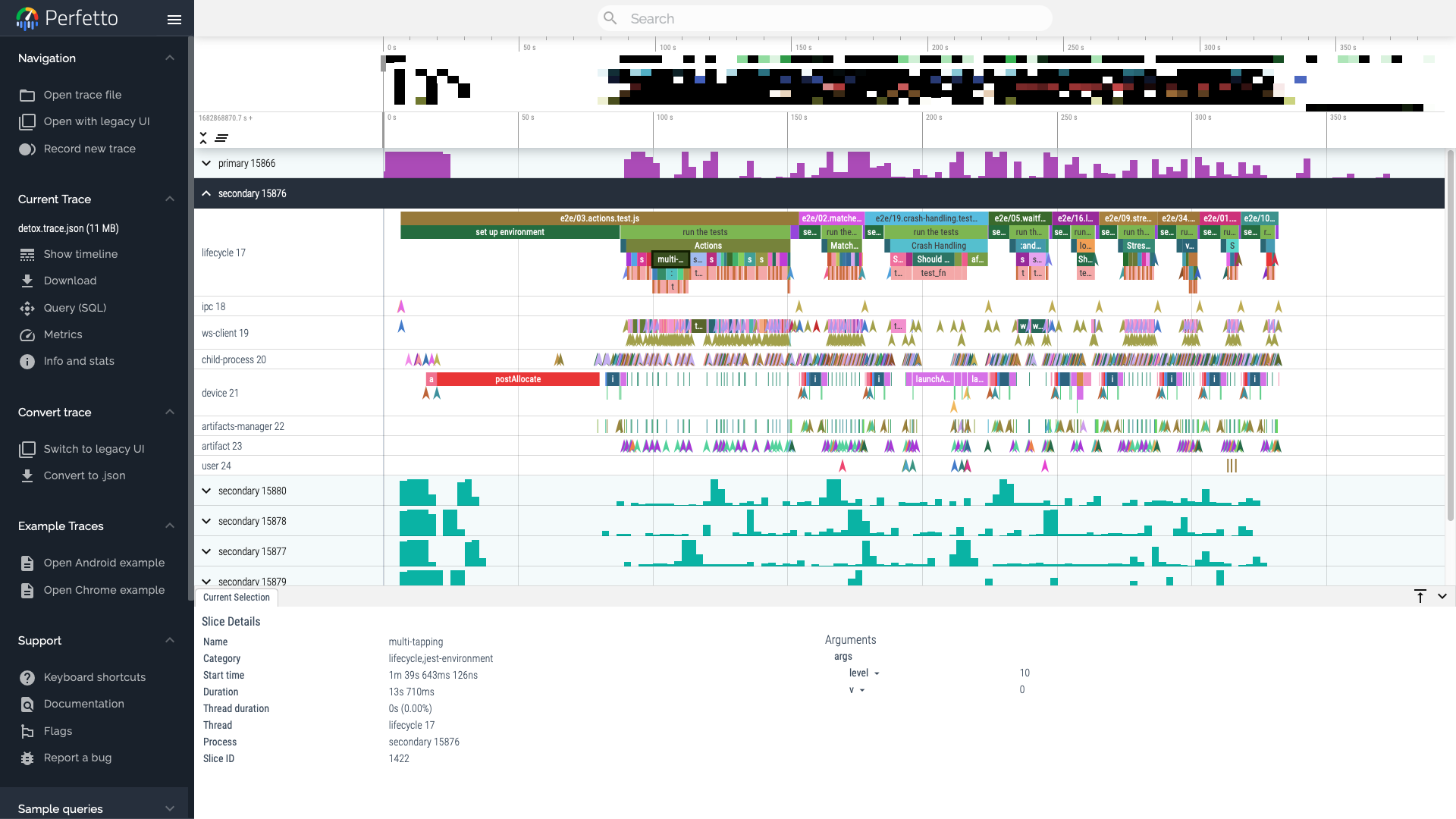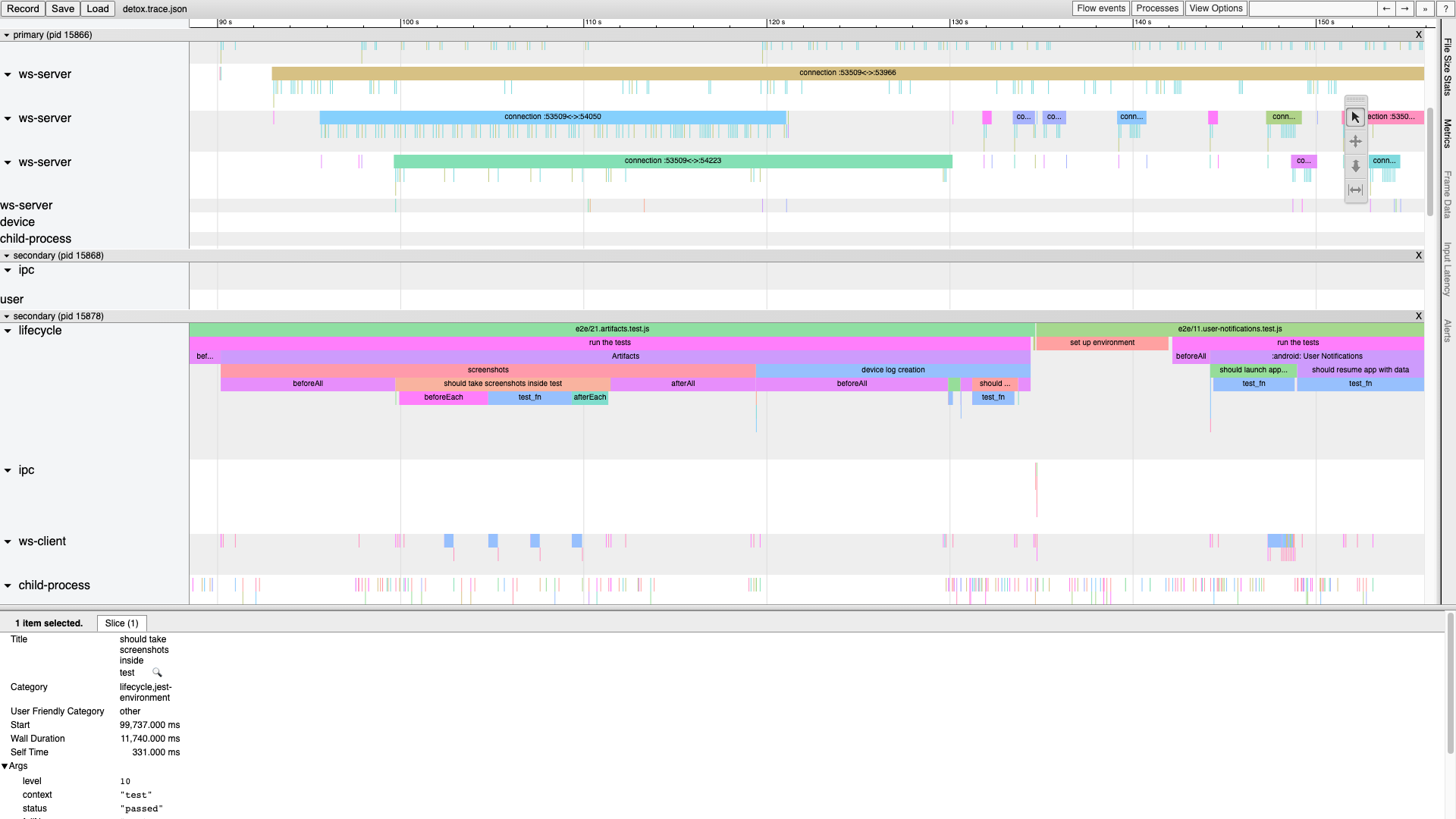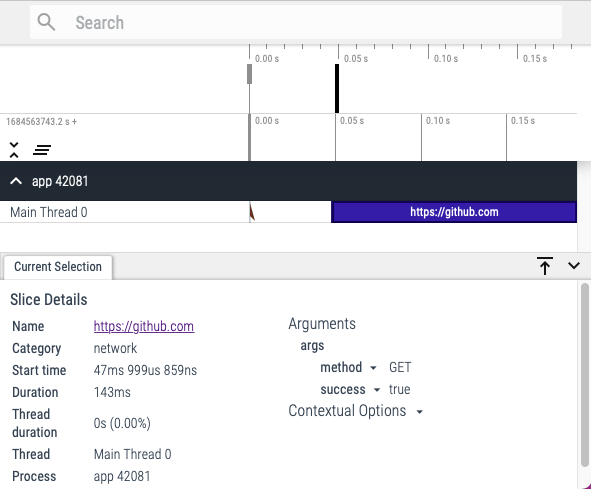





Bunyamin is a powerful extension of the node-bunyan logger, designed specifically to track and visualize parallel app activities. It can offer valuable insights into the performance and behavior of your Node.js applications. Originally developed as part of the Detox testing framework, Bunyamin can be utilized in an extensive range of libraries and programs.
- Built on the foundation of node-bunyan, a highly popular library with 1.5M weekly downloads.
- Generates logs which can be conveniently viewed in Perfetto UI,
chrome://tracing and other debugging tools. - Provides multiple log levels, including
fatal, error, warn, info, debug, and trace. - Offers attaching customizable metadata for logging events, such as event categories, color names and any custom properties.
- Supports parallel duration events, with the ability to stack events and mark them as completed.
- Has the ability to reconcile multiple trace event files, catering to advanced use scenarios.
Getting Started
To install the Bunyamin, run the following command:
npm install bunyan bunyamin --save
Once you have installed the logger, you can import it into your application and start logging events as you would
normally do with Bunyan:
import { createLogger } from 'bunyan';
import { wrapLogger, traceEventStream } from 'bunyamin';
const bunyan = createLogger({
name: 'my-app',
streams: [
{
level: 'trace',
stream: traceEventStream({
filePath: '/path/to/trace.json',
loglevel: 'trace',
}),
}
],
});
const logger = wrapLogger(bunyan);
logger.info('Starting the app');
const network = logger.child({ cat: 'network' });
const URL = 'https://github.com';
const res = await network.debug.complete({ method: 'GET' }, URL, fetch(URL));
Here's how the trace file would look like when visualized in Perfetto:

API
Log Levels
Bunyamin provides several log levels that you can use to categorize your log messages:
fatal,error,warn,info,debug,trace.
Each log level has a corresponding method on the logger instance, e.g.:
logger.info('This is an informational message');
logger.warn('This is a warning message');
logger.debug('This is a debug message');
You can also include additional metadata with your log messages by passing an object as the first argument to the log method:
logger.info({ cat: 'login', user: 'user@example.com' }, 'User logged in');
Duration events
This library also provides support for logging duration events, which can be used to track the duration of specific operations or functions. To log a duration event, you can use the begin and end methods:
logger.info.begin({ cat: 'login' }, 'Logging in');
logger.info.end('Login complete');
You can also use the complete method as a shorthand for logging a duration event:
await logger.info.complete({ cat: 'login' }, 'Logging in', async () => {
});
The complete method takes an optional metadata, a message and a function or promise to execute. It logs a begin event with the message before executing the function or promise, and a corresponding end event when the function or promise completes. Depending on the result of the operation, it might attach a boolean success result and err object.
Metadata
You can attach custom metadata to your log messages and duration events by passing an object as the first argument to the log method or event method. For example:
logger.info({ event: 'login', user: 'johndoe@example.com' }, 'User logged in');
logger.info.begin({ event: 'login' }, 'Logging in');
The LogEvent type provides a structure for defining metadata objects:
type LogEvent = {
cat?: string | string[];
cname?: string;
pid?: number;
tid?: number | string | [string, unknown];
[customProperty: string]: unknown;
};
The tid property can be used to assign an explicit thread id to the event or a thread alias,
which can be helpful when logging concurrent or overlapping events.
Child Loggers
Similar to Bunyan, you can create a child logger with a specific context by calling the child method on the parent logger:
const childLogger = logger.child({ component: 'Login' });
childLogger.info('Logging in');
The child logger inherits the log level and configuration options of the parent logger, but any additional metadata provided to the child logger is merged with the parent context.
Contributing
Contributions to Bunyamin are welcome! If you would like to contribute, please read our contributing guidelines and submit a pull request.
License
Bunyamin is licensed under the MIT License.








